Review for The Front Line
Introduction
For a long time now, the historical war movie has followed a certain pattern, working from the premise that war is a bad thing, and proceeding to show the hell that people inflict on each other in the name of faith, ideology or nationality. Ever since Vietnam, we've come to accept the futility, heartlessness and brutality of conflict as staples of the war movie, and quite rightly so. But there's something about a civil war which is far more poignant, and brings those issues to light with much greater clarity. After all, a civil war pits like against like, brother against brother, where both sides look the same, speak the same language, and eat the same food. In recent history, the last significant such conflict was the Korean civil war, and I have found few movies about conflict so affecting, as I have those films made in recent years in South Korea. Korean films like Brotherhood and Joint Security Area have given insights into civil war that few other film industries have been able to capture. Now there is a new war movie from South Korea, The Front Line, which was South Korea's entry as best foreign feature in this year's Academy Awards, although it didn't make the shortlist.
It's January 1953, and while war rages on the front lines, truce negotiations have been stalled for the past two years. Kang Eun-pyo is an intelligence officer who displays a lack of that attribute when he opens his mouth in the wrong place at the wrong time. The repressive regime in the South doesn't allow for any wayward opinion, so to punish him, Kang is assigned a mission to investigate Alligator Company. They've been entrenched at Aerok Hill, constantly battling the North over that barren piece of land. It turns out that somehow letters from the North have been mailed to the South via Alligator Company, using the military's own mail network. There is also the unexplained death in action of the former Captain of the unit, apparently shot with his own pistol. Kang is also surprised to learn that his friend, Kim Soo-hyeok, who he had thought lost since the start of the war when they were both captured by the North, has actually been serving in Alligator Company.
When Kang accompanies the replacement Captain to Aerok, they are both shocked to find that the reality of life on the front line is a lot different from what they expected. Discipline seems lax, morale is low, especially when all that the North and South forces do is continually take the same wretched hill from each other, in the hope that their side will hold it when the truce is finally declared, gaining that last precious few hundred metres of land. Kim is indeed in the company, although he's almost unrecognisable from the wet-behind-the-ears kid that Kang knew, cynical, isolated, and unrelenting. The acting captain is a drug addict, war orphans wander the camp, and one soldier is so shell-shocked that he keeps looking for comrades who died years before. As Kang continues to investigate, he learns that the accusations against Alligator Company are all true, but not in the way that he'd been told. The dark secrets that haunt Alligator Company are far more chilling, and nothing is as it seems at first glance. When the new Captain tries to stamp his authority by fortifying Aerok Hill in the worst possible way, the war between North and South heats up again, and Kang learns the true meaning of serving on the front line...
Picture
Once again, my relative inexperience with Blu-ray discs makes it hard for me to judge a visual transfer on its technical merits. To all intents and purposes, I found The Front Line to be perfect. Its 1.85:1 widescreen 1080p transfer was sharp, crystal clear, and vibrant in colour. The film looks astounding on this disc, and I was drawn into the experience fully. It's a good thing too, as The Front Line is certainly worthy of Oscar consideration in terms of production value. This is the best looking Korean feature I have yet seen, seamless in its use of CGI to enhance its period detail, rich in terms of production design, and with brilliantly choreographed action sequences. It's also of considerable merit in that it's a war movie that eschews the shaky cam, bleach by-pass, mega-de-saturation of the current vogue in war movies. The Front Line's colour palette and visual design is a little more subtle and makes for a more engaging film.
Sound
You have the choice between DTS-HD MA 5.1 Korean, and DD 2.0 Stereo Korean for those who aren't yet HD audio capable. English subtitles are provided and are of the optional variety. I went with the MA audio and it's a fitting surround track for a war movie, thunderous and bombastic when required, quiet and subtle also. The dialogue is clear throughout; including the dodgy bit of English language acting that often appears in these period Korean films. The music is understated for the most part, eschewing the emotive and melodramatic themes that tend to populate war movies. The subtitles are clear, free of error, and timed accurately throughout.
Extras
The Blu-ray gets the standard animated menu screen from Cine Asia, scenes from the film playing, with a bar across the top of the screen listing your options.
On the disc, you'll find 12 trailers for other Cine Asia product, including the forthcoming 1911: Revolution from Jackie Chan. The trailer gallery houses the UK and original theatrical trailers for The Front Line (The original trailer is in SD).
The big extra of course is the info-dump a.k.a. audio commentary from Bey Logan. Once again, he provides an engaging, informative and rich supplement to the film, talking about the movie, the cast, the filming, and of course the story, and the history behind the Korean War.
The other extras on the disc are all in SD format, beginning with a brief Making Of the film that runs to 4 minutes. This focuses more on the process of selecting the all-important Aerok Hill location.
A Daily Record of Battle - Making of Production runs longer to 33 minutes. Here you'll see the actors getting to grips with period weaponry, some b-roll footage of the shooting, interviews with the cast and crew, and some of the tensions that rose on set during filming.
Aero-K Hill - Action & SFX Making Of lasts 22 minutes, and as you would expect takes us more behind the scenes of the effects work. This is more the practical side of things, in terms of make-up, props, and staging the battle sequences.
Ceasefire Agreement - Production Design lasts 20 minutes, and offers more of a perspective on the shooting of the interior scenes, and there's a hint of some scenes that didn't make the final cut.
Conclusion
The Front Line is one of those rare films that I enjoy much more in retrospect, than I do while watching it. It's a powerful war drama, a gripping movie with perhaps the best production values I have yet seen in a Korean film. While watching it however, it feels like just another war movie, and once you have seen Saving Private Ryan, Enemy at the Gates, Band of Brothers, and several of the other war films of recent years, there's a familiarity and even tiredness to the film that tends to detract. Scenes in the film will remind you of similar scenes in other movies, and the immediate impact of The Front Line is lessened as a result. It's just that after the final scene, and the end credits, I found myself re-evaluating the film, judging it on its own merits, and I realised that there is much to recommend this film.
The performances are strong, the characters are well written, although they do seem to feature a fair few of the clichés that populate war movies. The main character Kang pretty much serves as an everyman character, an observer presenting the point of view of the audience, as he pursues his investigation into Alligator Company. There's the inexperienced rookie who joins the Company with him, as well as the know-it-all Captain. The veterans of Alligator Company are a more damaged group of soldiers, beaten back by what the war has thrown at them. Some have managed to hold onto their humanity with a sense of dark humour, while others have lost their humanity as a result of the challenges they have faced. You have the drug addict, the cynic, the mental breakdown; you have the happy-go-lucky guy, the guy who's always thinking of his family... Clichés they may be, but they are performed by a cast of seasoned actors who bring out depth in their roles.
The action sequences too are of high quality, and with the absence of shaky cam techniques, are actually clear to watch and easy to comprehend. The director makes use of long shots, and careful choreography to orchestrate the battles, and the effect on screen presents a war that is twenty times as chaotic and frenetic as it is when you see the featurettes where they actually shoot the scenes.
Where The Front Line really excels is in the story, which is as far from a straightforward war movie as you can expect. The poignancy of brother fighting brother is never lost, but the initial set up is that of a mystery to be solved, when Kang is sent to Aerok to investigate Alligator Company. The movie becomes about uncovering secrets and revealing truths best left buried. The regime is repressive enough in the South, the communists in the North simply complicate the issue, and from the off there is a sense of paranoia and tension. But the story is never as simple as just the investigation, and it twists and turns, delivering unexpected revelation upon revelation. Just when you think you have a handle on the story, it switches back on you, does something completely unexpected, to have you scratching your head once more. None of the characters are exactly as they appear to be, and all of them have skeletons in their pasts that haunt and drive them even as they continue to fight for Aerok Hill. It's very rare for a war film to be consistently surprising, but The Front Line had me guessing until the very last scene, yet delivered an ending that was absolutely worth it.
The one aspect of The Front Line that I didn't appreciate was the thickness with which the 'War is Hell' cliché was applied. It's pretty obvious from what was happening on screen just how dire and futile the situation was, from the idiocy of the back and forth conflict over Aerok, to the moronic commands that were issued from armchair generals right until the final moment of the war. You can see from the story that it was bloody, soul-sapping and heart-wrenching, and you would expect those in the middle of the situation to complain. However in The Front Line, it almost feels as the film pauses at times to allow a character pronouncement on the situation, philosophical observations on the war seem shoe-horned in, and there are times where the Message overwhelms the story. Ultimately the Message does pay off, as the final scene is all Message, yet it is as fitting an end to the film as I can imagine. It's just that at other times it could have done with being pulled back a bit.
The Front Line is the latest in a recent tradition of great Korean War movies. Ironically it's a conflict that has been relatively neglected by Hollywood, Pork Chop Hill and M*A*S*H notwithstanding. The fact that Korean film makers can revisit their history with such effectiveness at least means that there's no danger of this tragic conflict from ever being forgotten.
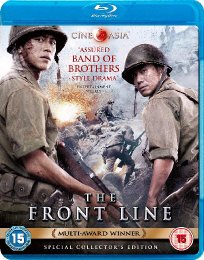






































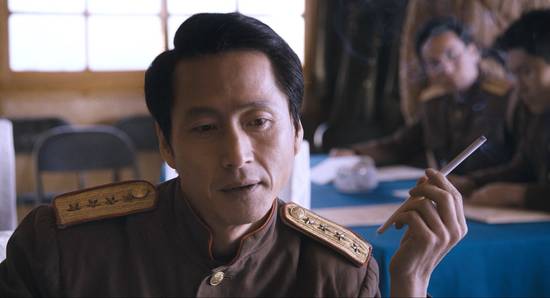
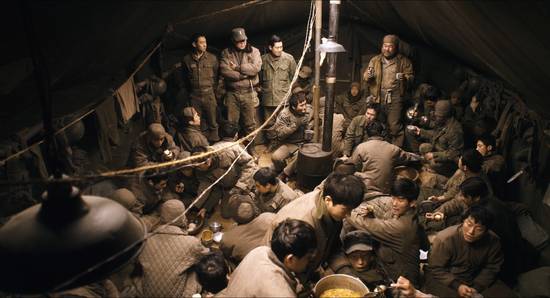
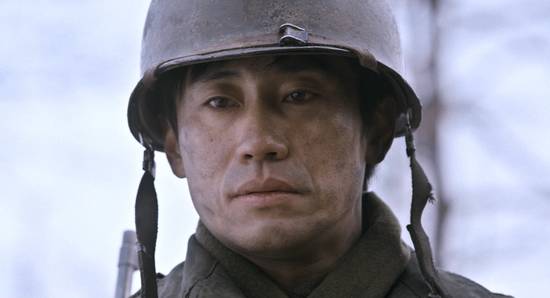
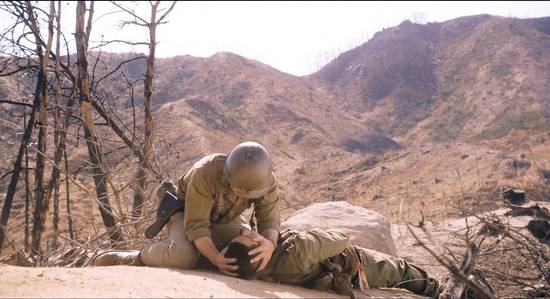
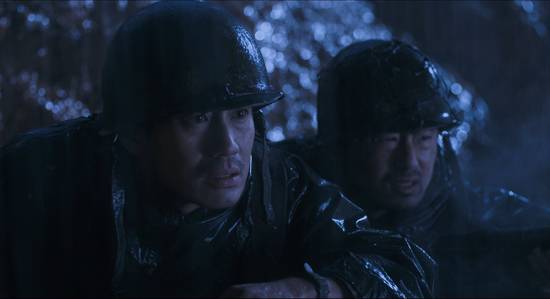
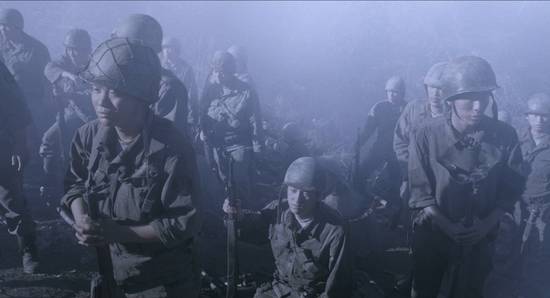
Your Opinions and Comments